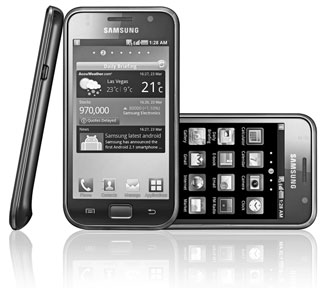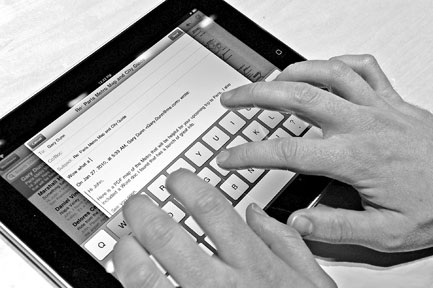 |
|
An Android smartphone |
With mobile devices taking over...:
Is the World Wide Web dying?
By Pramod DE SILVA
There are a few things that we take for granted in our lives and one
of them did not even exist just 20 years ago! Yes, the World Wide Web
has invaded every corner of the globe and many of us cannot imagine a
world without it. Gone are the days when we referred to bulky tomes to
find things out. Now we just get on the Web and fire a search engine.
Our answer appears in a second on the screen. Likewise, the Web has
trillions of pages on everything under the sun.
In fact, between 1995 and 2006, the total amount of Web traffic went
from about 10 terabytes a month to 1,000,000 terabytes (or one exabyte).
During the last five years alone, total Internet traffic rose from about
one exabyte to seven exabytes. Thus the Web is easily the most
significant contemporary phenomenon.
But there are indications that the dominance of the Web may be coming
to an end, at least in the form that we know it - on a PC or laptop
screen. The answer lies in those ubiquitous little devices that we carry
everywhere we go - mobile phones. They too were virtually unheard of
just 20 years ago, but hardly anyone is without one now. In fact, there
is a new name for a phone that does everything - smartphone.
The smartphone revolution probably started in earnest in 2007 with
the introduction of Apple's iPhone, which has since set the benchmark
for smartphones. Apple recently added another gadget to its arsenal that
may hasten the Web's exit - the iPad, a touchscreen tablet computer with
a Wi-Fi and 3G cellular connection.
Similar devices are on the way from a host of other manufacturers.
Google's Android operating system is being increasingly adapted by many
manufacturers, RIM has its Blackberry devices and Symbian and Windows
Mobile platforms are also in the fray. All these devices are gateways to
a world of information. But how did the iPhone and its ilk manage to
topple the Web off its high pedestal?
The answer is a little three letter word - App. Short for
Application(s), it is a smartphone extension or widget that can perform
a specific task. As our lives are increasingly tied to the smartphone
and their derivatives (like Apple's iPod Touch which is really an iPhone
without the phone), we are accessing more information through mobile
devices, bypassing the Web altogether. The emphasis here is on the term
'Web', which is just one part of the Internet.
I used to switch on the TV to catch the early morning news on the
likes of CNN and BBC, but now that I have an iPod Touch, it is no longer
necessary to stare passively at the tube. While having my morning cuppa,
I just switch on the Touch, gently tap the CNN and BBC icons to get my
daily fix of news from around the world. Then if I have more time, I use
the apps for the Washington Post, AP, Time, Thomson Reuters, Yahoo News,
USA Today, WSJ, etc.
My email is just one tap away and I can even type a quick response on
the touchscreen. I look for updates on Facebook (Facebook has been
installed on 100 million Apple devices alone) and Twitter in just a few
minutes. I can chat with my brother in the US on Skype, listen to almost
any radio station in the world, complete the New York Times crossword,
download a new recipe, check the weather, catch the latest issue of GQ,
view the latest viral YouTube videos, download the latest thriller,
listen to an audiobook, check the latest cricket, football and rugby
scores and even check for the latest earthquake - all without going
anywhere near a conventional PC thanks to the apps on my Touch.
Online games
Well, I can even play an online game with someone on the other side
of the world if I am bored, not to mention watching an episode of a TV
show that I missed when it originally aired. Booking an airline ticket?
Don't go anywhere near a PC - just use an airline app. As the saying
goes, 'There's an App for that', whatever 'that' is.
 |
|
An Apple iPad in action |
Was I on the Web? Not in the conventional sense of the word. Was I on
the Internet? Yes, and this is how we will increasingly interact with
the Internet in the years to come. Experts are predicting a slow death
for the conventional Web and there is a furious debate on - where else?
- the Web about its own predicted demise.
It was tech guru Chris Anderson who recently started this debate with
a controversial article titled 'The Web is Dead, Long Live the Internet'
in the latest issue of the prestigious Wired magazine, which is
incidentally available on the Web (wired.com) as well as on the Apple
iPhone/iPad universe.
Anderson argues that the Internet is simply the platform which can be
accessed in many ways, of which the Web browser is just one, and in many
cases the least convenient. Ease of use is driving people to use
specialised apps and devices to access the Internet, rather than the
PC-based Web browser (Internet Explorer, Firefox, Google Chrome, Opera
or Safari).
Anderson writes: "The Web is, after all, just one of many
applications that exist on the Internet, which uses the IP and TCP
protocols to move packets around. This architecture - not the specific
applications built on top of it - is the revolution. Today the content
you see in your browser-largely HTML data delivered via the http
protocol on port 80-accounts for less than a quarter of the traffic on
the Internet...and it's shrinking.
Mobile traffic
"And the shift is only accelerating. Within five years, Morgan
Stanley projects, the number of users accessing the Net from mobile
devices will surpass the number who access it from PCs. Because the
screens are smaller, such mobile traffic tends to be driven by specialty
software, mostly apps, designed for a single purpose. For the sake of
the optimised experience on mobile devices, users forgo the
general-purpose browser. They use the Net, but not the Web. Fast beats
flexible."
I can see his point. Why go the whole hog and boot up your PC, wait
for ages for the operating system to get its act together and open your
browser when you can check out your favourite sites anywhere there's a
Wi-Fi or 3G signal? Phone/iPad apps are instantly on and present you the
information you need without a hassle. You do not even have to enter any
WWW addresses (there goes the Web), the apps take care of everything.
No wonder more newspapers and more companies are coming with
smartphone apps to capture this growing segment of the Net. Advertisers
love it too - they can target a particular audience without having a
presence all over the Web. Magazine publishers who tried to rake in
money from the Web, but failed miserably, love the iPad, because Apple
controls the App market and consumers willingly pay for such content. It
is not surprising that Rupert Murdoch wants to start an iPad newspaper
which will not have a print version.
Even if you are on a traditional PC, there are so-called 'web apps'
which do much the same thing without involving a browser. In any case,
the PC with a hard drive is becoming an archaic concept with the advent
of 'cloud computing' where everything is stored online, ready to be
accessed by a variety of mobile and stationery devices.
This is not the first time that Wired dipped its toes in hot techno
water. In 1997, Wired published a now-infamous cover story which
suggested that it was time to "kiss your browser goodbye." That was 13
years ago. In 2010, it is no longer an impossible scenario.
Of course, we are unlikely to witness the extinction of the Web page
per se . Radio survived television, CDs are still selling in the iTunes
age and books will somehow survive at least as a niche market despite
the onset of e-books and e-readers. Technology evolves and the same
technology sometimes takes different forms. Such a revolution is taking
place in the Internet right now.
The implications are simply staggering. One such area which is going
to change the Internet forever is 'Augmented Reality' (AR), which is
tailor-made for mobile devices. Download an app such as Pocket Universe
or Star Walk to your iPhone, point the phone camera at the night sky and
the phone will instantly find out where you are through its GPS and name
all the stars that you can see. Need more information on the stars? Just
leave it to the iPhone.
Or imagine that you are in a strange city. You just point your iPhone
at a particular building and it will name it, give additional details
and even tell you what other landmarks can be found around it, using GPS
and other data. And if you want to go to that restaurant shown by the
phone, it will guide you there, turn by turn.
Smartphones
Many more such AR apps are coming to smartphones in the future. There
are auditory AR apps as well, such as SoundHound. Open SoundHound on
your iPhone, point the phone to a speaker playing any (English) song and
it will instantly display the name of the artiste and even open iTunes
if you want to buy the song then and there. Such examples are way beyond
the capacity of traditional PCs or the traditional WWW.
 Not all experts believe that the end is nigh for the Web. Many have
criticised Anderson for including video download data in his research,
noting that most videos in fact originate from websites such as
www.youtube.com or www.vimeo.com, regardless of the destination device. Not all experts believe that the end is nigh for the Web. Many have
criticised Anderson for including video download data in his research,
noting that most videos in fact originate from websites such as
www.youtube.com or www.vimeo.com, regardless of the destination device.
Bernald Golden, an analyst with technology website CIO.com added: 'I
actually think Wired misses the much larger story, which is the
penetration of the Internet into every element of everyday life and the
changing nature of how we work based on the shift to digital
interaction. That is the big story."
Erick Schonfeld from TechCrunch has claimed Web browsers could in
fact evolve in the future to absorb the desktop and mobile apps that are
currently so popular.
Yet no one argues with Anderson on his central point - that more
Internet content is being directed to mobile devices as opposed to
deskbound PCs and laptops. That is the future and it is already here. In
the future, being on the Net will mean having an App for all smartphones,
not necessarily a WWW address. Companies that fail to comprehend this
shift stand to lose, as will traditional web designers who must now
exert their energies elsewhere. Reports of the imminent 'Death of the
Web' may be exaggerated, but it is getting there!
|

